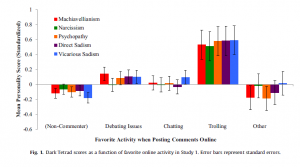I re-emerge! I have survived finals and am (impatiently, nervously) waiting on answers from grad school. This week involves vacationing in Boston and the reanimation of my blogging.
1. Every year, my college runs an Eating Disorder Awareness Week. And every year, I avoid the student union like a plague during the Eating Disorder Awareness week. I find the idea of everyone focusing on talking about loving their bodies overwhelming and triggering as hell, and know most of my friends with eating disorders do the same–avoiding an event that’s supposed to be about supporting their conditions. So, are there other benefits to be gained from the Week? Are we, perhaps decreasing stigma? Or preventing people who might be at risk for EDs from developing them? Yeah, no, probably not.
2. On April 4th through the 6th, I’ll be in Minneapolis, attending/speaking/running SkepTech. I attend a number of skeptoatheist conferences year to year, and SkepTech is one where I expect to attend and learn entirely new things from the speakers. Talks I’m anticipating: The Game Theory of Firefly, medical technology and making evidence-based funding decisions, and hearing all the interesting discussion on creating effective sex ed on the panel I’ll be moderating.
3. Forget the emotional burden of deciding to seek therapy–narrowing down who is a good therapist for you is hard. Here’s some advice.
4. And speaking of therapy and mental illness, yet ANOTHER excellent response to the question Are we pathologizing normalcy? Next, I’d like to stop having to constantly answer it.
As a sidenote, if anyone has high quality books that critique psychiatry or clinical psychology, please refer me. I’ve read American Psychosis (good, but focused on institutional care and deinstitutionalization), am reading Listening to Prozac (mostly because anti-psychiatry people always open by asking if I’ve read it) and was utterly unimpressed by Book of Woe.
As a psychiatrist, I see this as the biggest challenge facing psychiatry today. A large part of the population – perhaps even the majority – might benefit from some form of mental health care, but too many fear that modern psychiatry is on a mission to pathologise normal individuals with some dystopian plan fuelled by the greed of the pharmaceutical industry, all in order to put the populace on mind-numbing medications. Debates about psychiatric overdiagnosis have amplified in the wake of last year’s release of the newest edition of the Diagnostic and Statistical Manual of Mental Disorders (DSM-5), the so-called ‘bible of psychiatry’, with some particularly vocal critics coming from within the profession.
It’s true that the scope of psychiatry has greatly expanded over the past century. A hundred years ago, the profession had a near-exclusive focus on the custodial care of severely ill asylum patients. Now, psychiatric practice includes the office-based management of the ‘worried well’. The advent of psychotherapy, starting with the arrival of Sigmund Freud’s psychoanalysis at the turn of the 20th century, drove the shift. The ability to treat less severe forms of psychopathology – such as anxiety and so-called adjustment disorders related to life stressors – with the talking cure has had profound effects on mental health care in the United States.
5. Part of my job currently involves assessing surveys about religion and nonbelief; it’s lovely to see Pacific Standard talk about how careless survey questions and reporting can lead to unhelpful information.
6. This is an excellent summary of why engineering psychology is important. Pretty prostheses are not the most functional prostheses.
It’s easy to watch video clips of dexterous and dynamic prostheses and think, who wouldn’t want that? But there are plenty of circumstances in which prescribing such a device would be a misunderstanding of what a patient really needs. In one study that explored the needs of amputee farmers, the researchers interviewed a man who was given a myoelectric arm—something that is not only expensive, but also completely unsuited for farm work. Myoelectric devices cannot get wet or dirty, two things that are nearly guaranteed during a day of farming. The farmer in question simply kept the arm in his closet—a $100,000 device sitting there gathering dust.


